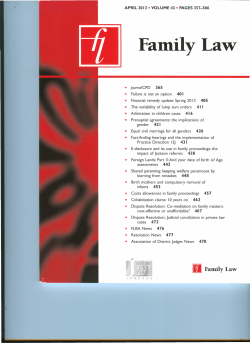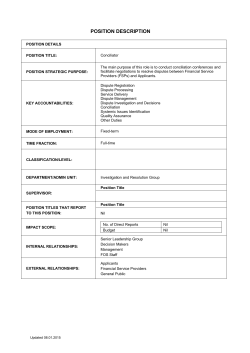
Industrial Relations & Industrial Disputes
Industrial Relations & Industrial Disputes Industrial Relations The term ‘Industrial Relations’ refers to relationships between management and labour or among employees and their organizations that characterize or grow out of employment. According to ILO, “ Industrial Relations deal with either the relationships between the state and the employers and the workers’ organization or the relation between the occupational organizations themselves.” Objectives of Industrial Relations To enhance the economic status of the worker. To regulate the production by minimizing industrial conflicts To provide an opportunity to the workers to have a say in the management and decision making. We can get max. output through min. input It is helpful for reducing the level of wastage. Objectives of Industrial Relations To encourage and develop trade unions in order to improve the worker’s collective strength. To avoid industrial conflicts maintain industrial democracy is the key factor of increasing the productivity. Significance of Industrial Relations Industrial peace Industrial Democracy Improved productivity Benefits to workers INDUSTRIAL DISPUTES According to The Industrial Disputes Act,1947, “ Industrial Dispute is any dispute or difference between employees and employees , or between employees & employers, or between employers & employers, which is connected with the employment, or non-employment, or the terms of employment or with the conditions of work of any person.” Thus it can be characterized as: The dispute could be between employer-employer, employee- employee or employer-employee. The dispute must pertain to some work-related issue. Dispute between one or two workmen and their employers is not an industrial dispute. TYPES: ACCORDING TO THE CODE OF INDUSTRIAL RELATIONS INTRODUCED IN THE UNITED KINGDOM IN 1972, DISPUTES ARE OF TWO TYPES: D I S P U T E S O F R I G H T S D I S P U T E S O F I N T E R E S T S Disputes of rights: the dispute related to the application of the existing agreement or contract of employment are known as the dispute of right. Dispute of interests: the disputes related to the claims by employees or proposals by a management about the terms and conditions of the employment are known as disputes of interests. Forms of Industrial Disputes strikes LockOuts Gherao Picketing & Boycott 1) Strikes A strike is a concerted withdrawal of labour from production temporarily. It is a collective stoppage of work by a group of workers for pressuring their employers to accept certain demands. Economic strike Sympathetic strike General strike Sit down strike Slow down strike Hunger strike 2) Lock-Outs Lock-out is the counterpart of strike. It is the weapon available to the employer to close down the factory till the workers agree to resume work on the conditions laid down by the employer. Industrial Dispute act, 1947; “ the closing of a place of an employment , or the suspension of work or the refusal of an employer to continue to employ any number of persons employed by him.” 3)Gherao Gherao means to surround. In this method, a group of workers initiate collective action aimed at preventing members of the management from leaving the office. 4) Picketing & Boycott When picketing, workers often carry/ display signs, banners & prevent others from entering the place of work and persuade others to join the strike. Boycott aims at disrupting the normal functioning of an enterprise. Industrial Disputes In India Workers were largely illiterates, had no organizing powers and clearly lacked strong union leaders who could fight on their behalf and deliver the goods. MACHINERY FOR PREVENTION & SETTELMENT OF DISPUTES VOLUNTARY METHODS - Collective Bargaining -Trade Unions -Joint Consultations -code of discipline GOVERNMENT MACHINERY -Labour Administration Machinery -State Level -Central Level STATUTORY MEASURES -Conciliation -Arbitration -Adjudication 1) Voluntary Methods a) Collective Bargaining Collective bargaining is a procedure by which the terms and conditions of workers are regulated by agreements between their bargaining agents and employers. The basic objective of collective bargaining is to arrive at an agreement on wages and other conditions of employment. b) Trade Unions Strong trade unions help prevent industrial disputes. They can bargain with employers effectively and seek quick redressal of grievances. A strong union can protect the employees interest relating to wages, benefits, job security, etc.. c) Joint Consultations works committees • It have to be set up in all those industrial units which employs 100 or more persons. Joint Management Councils (JMC) • The JMC should consist of equal numbers of representatives of workers and employers (minimum 6 and maximum 12) d) Standing Orders The term ‘Standing Orders’ refers to the rules and regulations which govern the conditions of employment of workers. The Industrial Employment (Standing Orders) Act of 1946 provides for the framing of standing orders in all industrial undertakings employing 100 or more workers. Statutory Measures a) Conciliation Conciliation is a process by which representatives of workers and employers are brought together before a third person or a group of persons with a view to persuade them to come to a mutually satisfying agreement. b) Voluntary Arbitration When conciliation proceedings fail to settle the dispute, the conciliation officer may persuade the conflicting parties to voluntarily refer the dispute to a third party known as Arbitrator, appointed by the parties themselves. The arbitrator listens to the viewpoints of both parties and delivers an award or judgement on the dispute. c) Adjudication Adjudication or compulsory arbitration is the ultimate remedy for the settlement of disputes in India. Adjudication consists of settling disputes through the intervention of third party appointed by the government. Adjudication Labour Court Industrial Tribunals National Tribunals Labour Court The labour court consists of one independent person who is or has been a judge of a High Court, or has been a district judge or additional district judge for not less than 3 years or has held any judicial office in India for not less than 7 years. Industrial Tribunal This is also a one-man adhoc body appointed by the Government. It has a wider jurisdiction than the labour court. The government concerned may appoint two assessors to advice the presiding officer in the proceedings. CHANNO National Tribunal This is the third one-man adjudicatory body to be appointed by the central government to deal with disputes of national importance or issues which are likely to affect the industrial establishments in more than one state.
© Copyright 2025





















